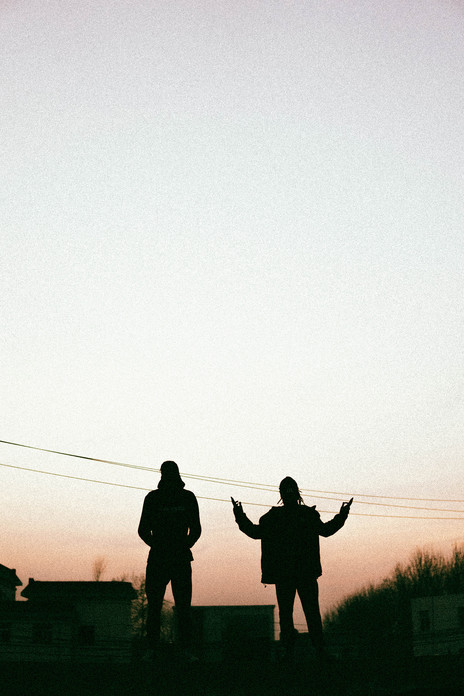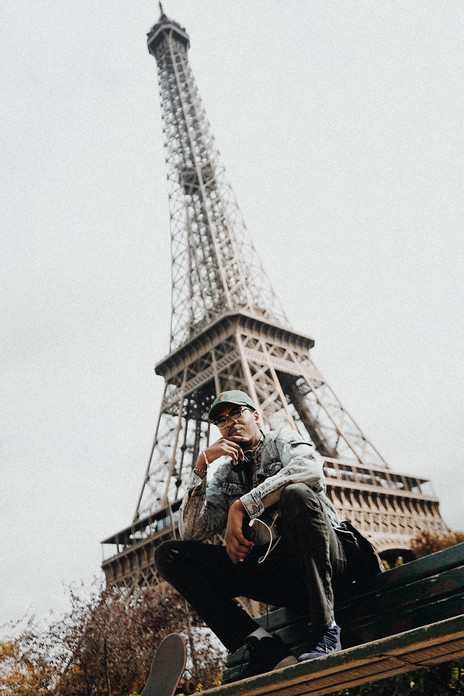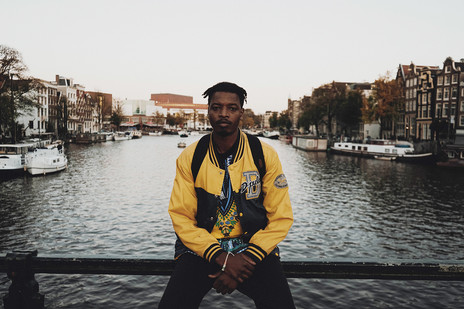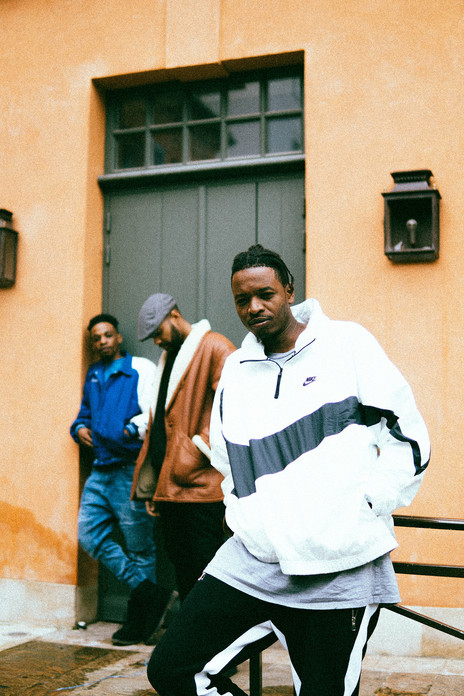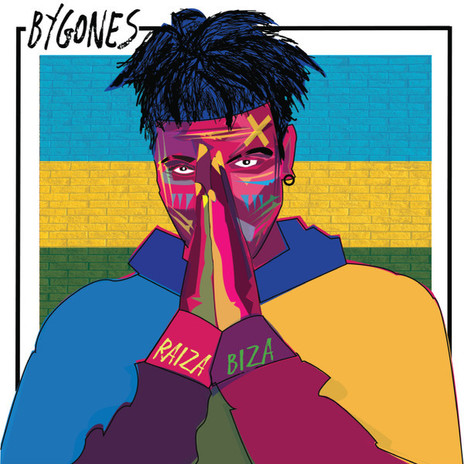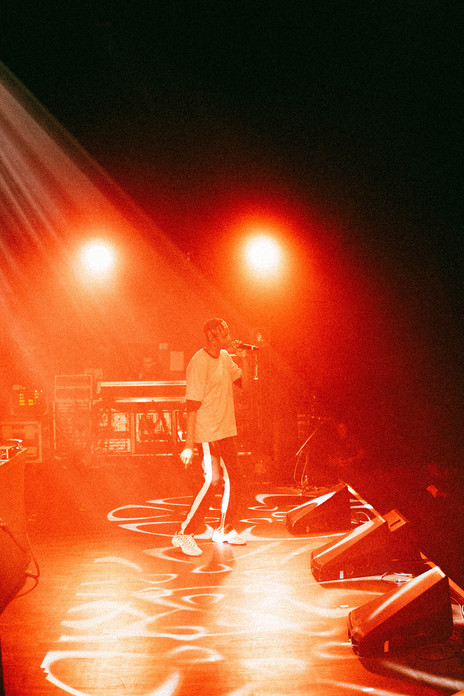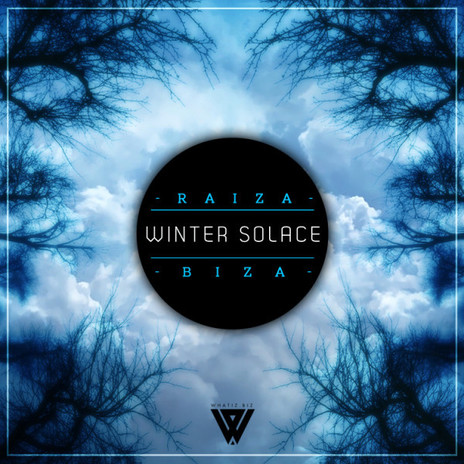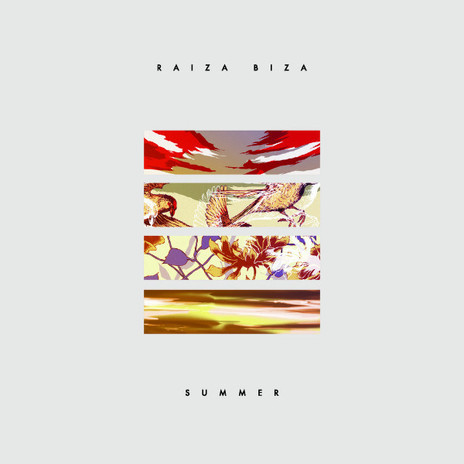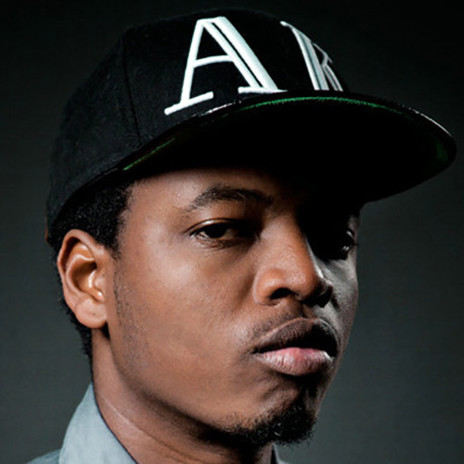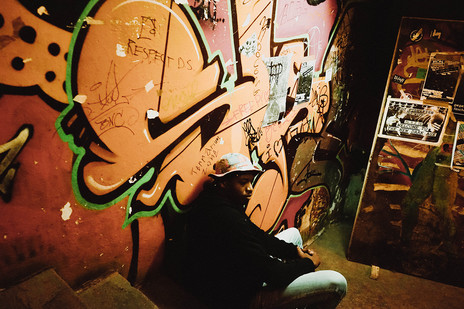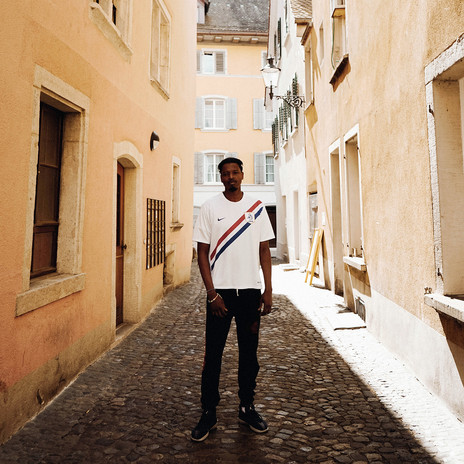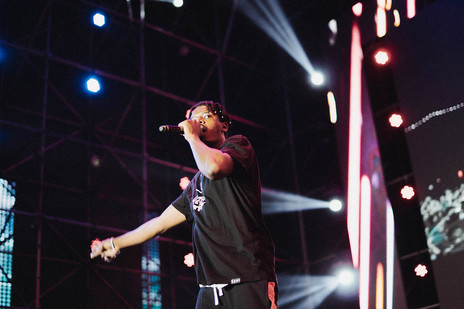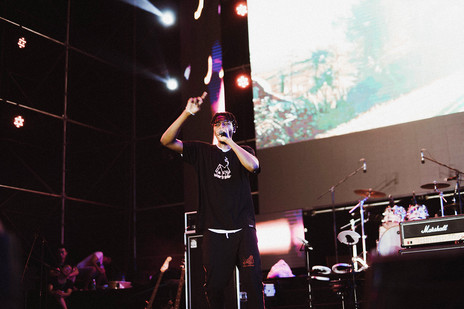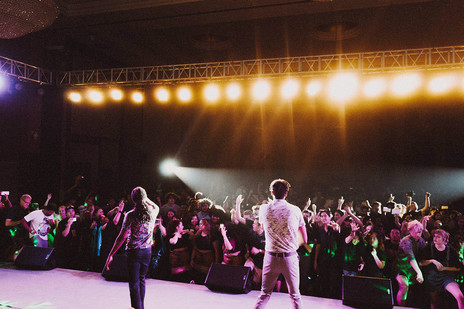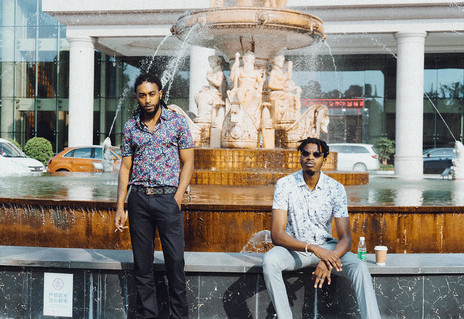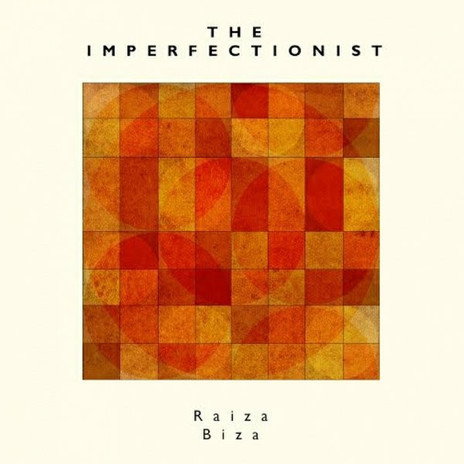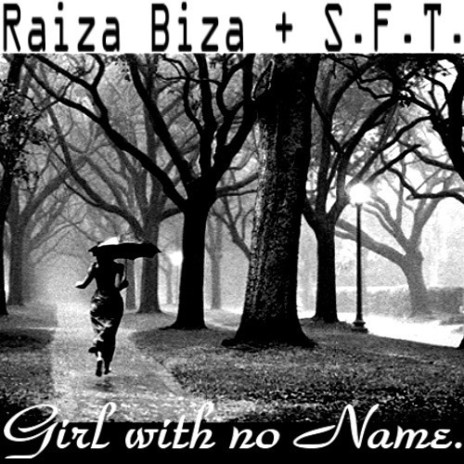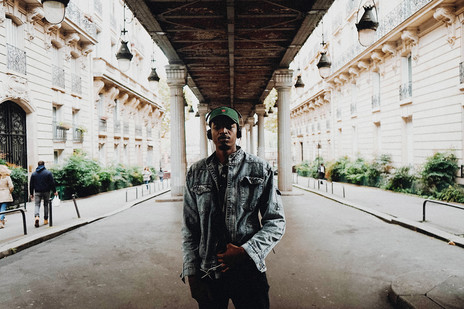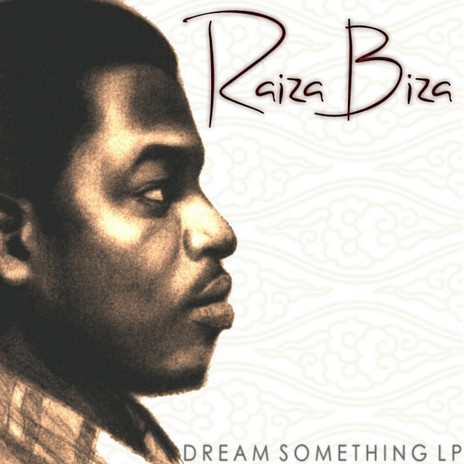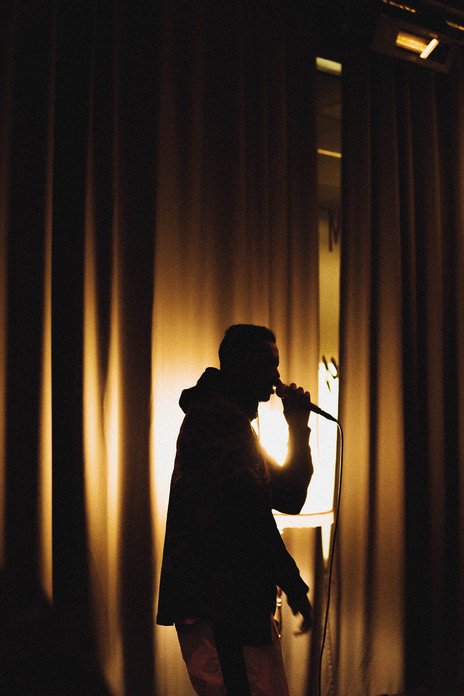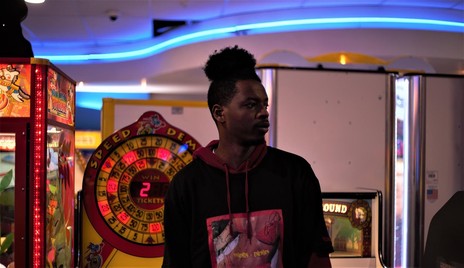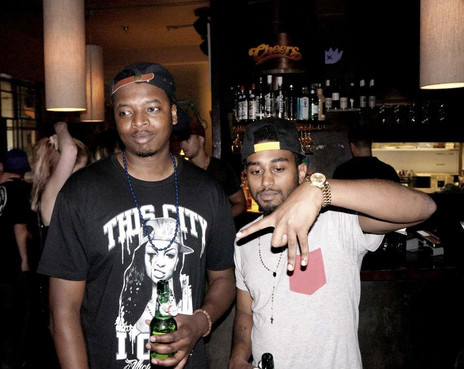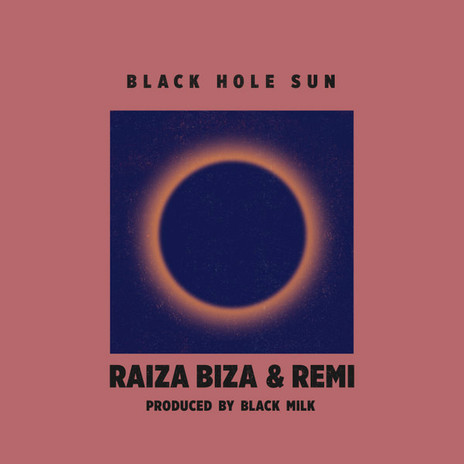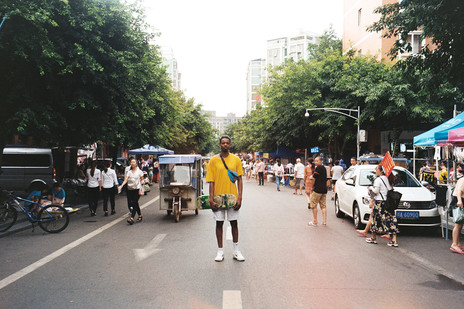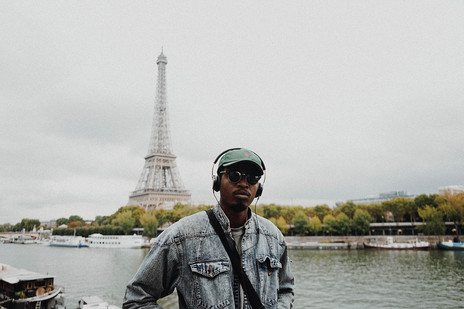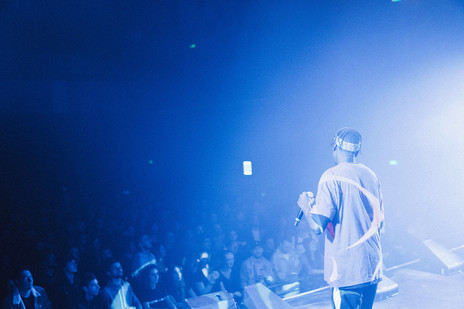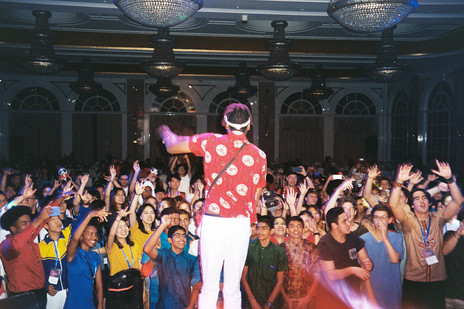The eldest child of a Rwandan couple who had the foresight to flee their homeland ahead of the Rwandan civil war, Ray Ruzibiza, aka Raiza Biza, was born in 1987 in the Democratic Republic of the Congo, then known as Zaire. The Ruzibizas spent the first four years of Raiza's life in Zaire and Zambia, living what he remembers as “a very idyllic village lifestyle” before his father began studying medicine and relocated the family to Johannesburg, South Africa.
As he entered his teenage years, Raiza fell in love with American hip-hop.
In 1994, following the end of apartheid, civil rights leader Nelson Mandela was elected president. In the wake of his ascent, a new Black middle class emerged across South Africa. During these years, Raiza’s father shifted from working as a general practitioner to becoming a psychiatrist. “My pops was a real go-getter,” Raiza said. “After working at a hospital for a while, he started his own private practice. Then he started buying property and cars.”
As he entered his teenage years in the late 90s, Raiza fell in love with American hip-hop. He was captivated by the beats, storytelling, style, and attitude of 2Pac, Bone Thugs-N-Harmony, Nas, Mos Def, and Talib Kweli. Just as he was beginning to understand the world within his context, his father informed him the family was relocating to a seaside town called Gisborne, on the East Coast of New Zealand’s North Island, literally half a world away. “My father made a good life for us, but money couldn’t buy safety in South Africa,” Raiza recalled.
After a period in Gisborne, the Ruzibizas moved across the North Island to Hamilton, where Raiza and his younger sister Beth, better known as Jane Deezy, began to write and record their first hip-hop songs with cheap microphones and bootleg recording software. Thinking back to those days, Raiza remembers making $1000 selling copies of his first hip-hop demo CD to fellow students at high school.
At the time, DJ Omega B from 4 Corners, DJ SMV and Tyna Keelan were running a weekly open microphone night called Lyricist Lounge at the now-shuttered Catalyst nightclub in Hamilton. Raiza would stand outside the venue as a teenager and rap to the security guards until they let him in. In many ways, getting on stage there was his first exposure to the local hip-hop scene.
In 2003, he made his way up to Auckland to attend the Aotearoa Hip Hop Summit, where he was blown away by seeing Malo Luafutu, aka Scribe, perform his anthemic hit ‘Stand Up’. “I think every rapper has a moment where they go from a fan to being like, I want to do that,” Raiza reflected. “That’s when I first thought, I really want this to be more than a hobby. I really want to make a real go of this.”
By his late teens, he’d had enough of Hamilton’s “sleepy nature” and ran away to Wellington with his Somalian best friend. They befriended a circle of young immigrants with creative aspirations. During sunny summer afternoons, they played basketball. By night, Raiza would freestyle with other rappers.
In the wake of Scribe, P-Money, and Savage’s meteoric commercial successes in the early 2000s, hip-hop felt like an ever-present force across the country. In Wellington, the local scene was deeply invested proving your skills on stage through MC and DJ battles. By 2006, Raiza (then known as Raysa) was going bar for bar with some of the top rappers in the city at events like the Clash of The Titans MC battle. However, after getting mixed up in some petty crime, he re-evaluated his situation. “Things stopped being fun,” he admitted. “I realised something needed to change.”
Resolved, Raiza returned to Hamilton to reconnect with his family and make amends. From there, he moved to Auckland for a spell and took on a full-time job in Onehunga. While living there, he started hanging out with a pioneering local African dancehall ragga crew, Young Shottaz. On the weekends, Raiza would return to Hamilton, where he was writing and recording with a producer named Crime Heat.
In 2011, two days after the 22 February earthquake struck Christchurch and claimed 185 lives, Raiza uploaded a hip-hop song called ‘State of Emergency (Christchurch Tribute)’ that expressed his horror at the tragedy unfolding.
By the end of 2012, Raiza had released Caged Lion, a collaborative hip-hop ragga EP with Zimbabwean vocalist Max from Young Shottaz, and his first solo mixtape, Dream Something. “All of the sacrifices my parents had made started to weigh down on me,” he said. “I knew I couldn’t waste the opportunities I had anymore.”
Supported by a cast of collaborators including Crime Heat, the beatmakers Jay Knight, Soulchef, S.F.T, and Si-Res, vocalist Amanda Djo and the actress/singer Esther Stephens, Raiza used Dream Something to announce his arrival to the national underground music scene. Soon enough, he was touring nightclubs across the country off the back of introspective and passionate rhythms set against dusty jazz and soul-infused sample beats.
As Amsterdam-based music blog The Find observed, “The beats are cooler than a lemonade ice cube, and Raiza Biza’s raps float atop the instrumentals like cirrus clouds drifting through the sky. The album is aptly titled Dream Something and will surely leave you well satiated if you are hungry for good hip-hop music.”
Over the following months, Raiza noticed that blog posts were part of a broader trend. “I realised I was starting to get media and blog love from outlets in all these European countries,” he reflected. “There was a pattern emerging where my specific blend of music seemed to resonate with people over there. I guess the ambition to tour Europe one day was born then, but at that point, it was more of a dream.”
By 2014 he was formalising his own predominantly African artist collective.
The following year, Raiza built on this dream with two more mixtapes, Summer and Winter Solstice, bringing new collaborators like RnB singer Bailey Wiley and drummer/producer Myele Manzanza into his world along the way. During the early 2010s, he approached recording, releasing music and touring with a diligent, hardworking attitude from his base of operations in Hamilton. Show by show, Raiza began to win over audiences from Auckland to Invercargill and back again.
By 2014 he was formalising his own predominantly African artist collective, AmmoNation. Raiza was also networking with a nationwide generation of musicians, producers, rappers, and vocalists associated with Avondale rapper and musician Tom Scott’s Young, Gifted & Broke collective (now known as Years Gone By). Raiza continued to play shows around the country, and began to score support slots before visiting US hip-hop stars such as Pharoahe Monch and Oddisee.
After playing with Oddisee, he had the opportunity to spend the following day with him. While hanging out, Raiza asked Oddisee how his first European tour came together. As Oddisee told him about sleeping on couches, pulling in favours, and travelling by train, Raiza started to feel he might be able to do something similar in the future. “After that, it became more of a strategy or goal and less of a dream,” he said.
That year, he connected with the local music and culture division of the global energy drink brand Red Bull. At the end of 2013, they had launched an episodic live event series called Red Bull Sound Select. They also regularly hosted artists to record projects in a studio space inside the brand’s Auckland office. In 2014, Raiza recorded his fourth project, The Imperfectionist, at Red Bull Studios with the audio engineer Ben Lawson.
Although the foundations of The Imperfectionist were crafted by his long-time producers Crime Heat and Jay Knight, the project saw him working with a cast of characters he’d met over the previous few years. Haz Beats from Home Brew contributed a beat, as did P-Money. He was joined on the record by a range of local rappers and vocalists, including PNC, Spycc from SWIDT, the Third3ye crew, members of The Super Villains, Diaz Grimm, Rizvan, Bailey Wiley, and Bianca Paulus.
In the wake of The Imperfectionist, Raiza began performing with a live band that included Mount Maunganui-based percussionist and producer Tia Drumma on drums and Palestinian DJ and producer Ill Baz on turntables. As the buzz around him grew, 2015 saw them play a 14-show national tour around New Zealand with Six60 and Mt Eden Dubstep.
By the mid-2010s, Raiza’s dreams of touring Europe were coming to fruition. Over the first half of 2016, he went through the contacts he’d built up online over the previous four years, presented them with a window of opportunity, and was able to start making some traction. In September of that year, he released an EP titled Day & Night. Several weeks later, Raiza and his fellow AmmoNation member Blaze The Emperor headed to Europe for two weeks on a self-financed tour. They travelled through The Netherlands, France, the UK, and Germany, where he recorded a video performance for the prestigious Berlin-based music platform Colours.
“They were some of the best audiences I’d performed for at the time,” he remembered. “A lot of the attendees came because they’d heard it was a New Zealand artist or because they heard it was someone from overseas. I still had to fight to convert the other half. People didn’t come through to hold the wall up, though. They came through with open minds and walked away having enjoyed themselves.”
In 2017, Raiza released a series of singles produced by Bristol-based hip-hop DJ and beatmaker Ile Flottante and a Parisian named Tito Fiasco. He also participated in the APRA SongHubs workshop at Roundhead studios in Auckland, where he recorded with respected US producer Mike Elizondo. Later that year, Raiza embarked on a second European tour through Italy, Switzerland, France, Germany, The Netherlands, and the UK, with support from the Auckland rapper Kenny Slade. On that trip, he took along a teenage filmmaker from Napier, Connor Pritchard, to document the tour and film several music videos. Off the back of that experience, Connor became Raiza’s videographer of choice.
In early 2018, Raiza returned to the northern hemisphere for his third European tour. Afterwards, he teamed up with his long-time friends, Avondale rapper Melodownz (of Third3ye) and Ill Baz, to form a new group, High Beams. Having bonded while running a series of community music workshops together, they set about recording in Red Bull Studios, Auckland. The fruit of their labour was a self-titled album with guest appearances from a pre-fame Teeks, the Aotearoa hip-hop/RnB legend Che Fu, Auckland rapper Dirty and the Royal Oak producer/vocalist HIGH HØØPS.
Later that year, Raiza contributed to Haja – the debut album from Shihad frontman Jon Toogood’s The Adults band project – and worked with Wellington vocalist/producer Estère. He also headed to Australia to record Black Hole Sun, a collaborative album with Melbourne MCs REMI, Sampa The Great and Baro, and Detroit hip-hop producer Black Milk, for the Australian label Low Key Source, before travelling to China for several festival shows.
“My career has been a slow burn ... I had to earn every fan one by one.” – Raiza Biza
Afterwards, he spent the rest of the year and early 2019 touring New Zealand and Australia to promote High Beams and Black Hole Sun. Over the next six months, he took time out to record a new solo album, Bygones, again for Low Key Source. It featured collaborations with Oddisee and REMI, newer faces such as Embher and VULC, and old friends like Blaze The Emperor. While writing Bygones, Raiza found inspiration in 1960s/1970s Black American soul and funk legends such as Marvin Gaye and The Gap Band, making for the most sophisticated set of songs he had recorded up until that point. Bygones also marked the moment when Raiza began to open up publicly about a side of his life he’d kept out of the spotlight until that point, being a father to three children in Hamilton.
As the year drew to a close, he teamed up with fellow African New Zealand hip-hop artists Jess B, Mo Muse, Blaze The Emperor, and Abdul Kay to form a new supergroup, BLKCITY. That summer, they played several festival shows before recording and releasing several singles as the country headed into the first national Covid lockdown.
In February 2021, Raiza explained his thoughts on Blkcity’s aims to Jonique Purcell at The Spinoff. “I think we’re all aware of the trap of being put into a specific box because of our experience as solo artists. They’ll class us as role models and put us on a pedestal. I don’t think we want that. It’s just us doing what we’ve been doing. We don’t even know what the results are going to be yet. In 10 years, we’ll know what it was, but I think that we’re being conscious of staying in the moment and not getting ahead of ourselves.”
Throughout 2020 and 2021, Raiza continued to record and release a series of singles and longer projects, including Grand Opening, Grand Closing, and A Summer In Retrograde. Released at the height of the first Covid lockdown, Grand Opening, Grand Closing was a concept record about a relationship's beginning, middle, and end. It saw him getting personal like he rarely had before. Released in early 2021, A Summer In Retrograde was his homage to the afterglow of 2020/201 post-lockdown summer and featured collaborations with the well-known New Zealand soul singer Hollie Smith.
Since then, Raiza has continued to record and perform across New Zealand and Australia regularly. As he told Australian website Beat in August 2022, “My career has been a slow burn. There was no moment where I blew up or thought I was there. I had to earn every fan one by one. I had to play small shows and then bigger shows, and then bigger shows. I just built it from the ground up … I make a living from my music now, but it’s tough when you see your friends in corporate jobs … buying houses or getting forward in life while what you do has no promise. So, I guess the biggest challenge is not quitting.”
